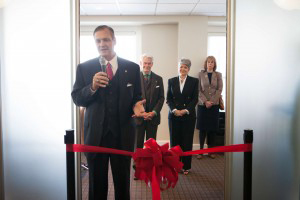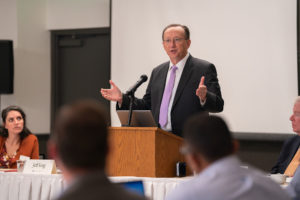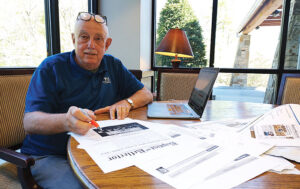
LOUISVILLE, Ky. (BP) — With 1.6 billion adherents, Muslims make up nearly a quarter of the world’s population. Seminary president R. Albert Mohler describes Islam as the “great rival system of belief.”
In response to Islam’s growing influence, Southern Baptist Theological Seminary in Louisville, Ky., has launched a new center for the study of Islam, with J.D. Greear and Michael Youssef as two of its founding fellows.
Southern is among five SBC seminaries that offer courses or degrees focused on the study of Islam.
Southern’s Jenkins Center for the Christian Understanding of Islam, named for donors Connie and Bill Jenkins, will study and engage Islam, with an emphasis on evangelism and apologetics. A team of fellows who are experts in Islam will lead the center in conducting research, offering seminars and publishing literature. The center will also host conferences and summits with Islamic scholars from around the world.
Faithfulness to the Great Commission requires ministers to study Islam “not merely to understand [it] as others might seek to understand it, but to achieve a Christian understanding of Islam,” Mohler said.
The dedication coincided with the seminary’s annual Great Commission Week in February. The four-day event included panel discussions with veteran missionaries and church planters, outreach projects in Louisville and evangelistic training sessions.
“I am personally grateful for the generosity of the Jenkins family and believe that this center will be significantly instrumental in the effective training of future generations of Gospel ministers,” Randy Stinson, Southern’s provost and senior vice president for academic administration, said.
The center opens with four fellows, two of which cannot be announced for security reasons related to their work. The other two, Greear and Youssef, live in the United States.
Greear, lead pastor of The Summit Church in Durham, N.C., studied Islamic theology during his doctoral work at Southeastern Baptist Theological Seminary and served as a missionary among Muslims prior to pastoring in the United States.
“In many ways, Islam represents the ‘great frontier’ for the Christian church,” Greear said. “How exciting to see God bringing together such a high caliber team of Gospel-saturated, faith-filled believers at Southern Seminary … for the salvation of Muslims. I am excited about the discussions and the future together. Might our generation be the one that sees this vast network of unreached peoples turned for the Gospel?”
The Egyptian-born Youssef is an author, founding rector of the Church of the Apostles in Atlanta, Ga., and founder and president of Leading The Way, a worldwide media ministry. The seminary planned for Youssef to present the inaugural Jenkins Center lecture in conjunction with the launch. However, inclement weather prohibited his traveling to Louisville. Youssef was scheduled to give the inaugural lecture at a later date.
In place of Youssef, Mohler addressed the topic, “Monotheism Is Not Enough.” Speaking from James 2:19, he objected to the common classification of Judaism, Christianity and Islam as the three “Abrahamic religions.”
“We often hear … the idea that there are three Abrahamic faiths. I can only imagine what Abraham would say to that,” Mohler said, referencing an exchange in John 8, where Jesus said the true children of Abraham are men and women who believe in Him.
While Abraham was certainly a monotheist, Mohler said, he “learned to look forward and trust God for his unilateral provision for salvation,” he said. “Monotheism is not enough.”
Mohler described “two great rival systems of belief,” arguing that Islam represents the “main rival” to Christianity around the world.
“In the West, that main system of belief is modern secularism — which is a complete worldview system. But almost everywhere else in the world, Islam is the main rival in terms of the belief systems that take a hold of humanity,” he said.
Mohler outlined challenges Islam presents to the church, starting with demographics. He pointed out that the vast majority of unreached people live in Islamic nations or in regions where Muslims are the majority, explaining that increasingly the task of Christian missions requires engaging Islam. Understanding Islam is a “non-negotiable” for 21st century ministers, he said.
Loving Muslims is among the most important challenges facing Christians, Mohler said. Love requires engaging Muslims in “honest and accurate” and “loving and respectful” ways, he said.
“Jesus ordered us to go into all the world and to find all the world as our neighbor — a neighbor we are to love,” he said. “And if we do love, we will seek to understand what they believe and we seek to confront them with the Gospel.”
The Jenkins family attended the Jenkins Center dedication service and ribbon-cutting ceremony. Bill Jenkins is co-founder and manager of Mainstream Investments and Advisors in New Albany, Ind. Connie Jenkins is a graduate of the Women’s Ministry Institute at Southern Seminary and an active participant in women’s ministry.
The Jenkins Center website — jenkins.sbts.edu — provides information about and resources for the engagement of Islam.
Among the ways other SBC seminaries engage Islam:
— Southwestern Baptist Theological Seminary in Fort Worth, Texas, offers a master of arts in Islamic studies, a concentration in Islamic studies within its master of divinity degree and a minor in Islamic studies within its Ph.D. program.
— Golden Gate Baptist Theological Seminary in Mill Valley, Calif., offers courses on Islam for students in various master’s-level programs. The seminary’s annual missions conference focused this year on Christian movements in the Muslim world.
— Southeastern Baptist Theological Seminary in Wake Forest, N.C., offers two master’s degrees with opportunities for a focus on Islamic studies. Anthony Greenham, associate professor of missions and Islamic studies, worked in Jordan, Iran and Israel as a South African diplomat in the 1980s and 1990s.
— New Orleans Baptist Theological Seminary offers two graduate certificates in Islamic studies and a master of divinity with specialization in Islamic studies, including courses in Islamic theology. Master of arts students in two degree tracks may opt for an Islamic studies concentration.
–30–
Based on reporting by Southern Seminary’s Aaron Cline Hanbury and writers at the other SBC seminaries. Get Baptist Press headlines and breaking news on Twitter (@BaptistPress), Facebook (Facebook.com/BaptistPress) and in your email (baptistpress.com/SubscribeBP.asp).















